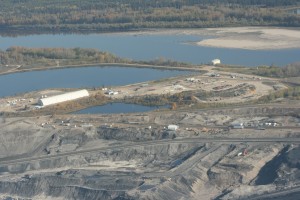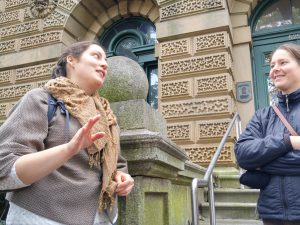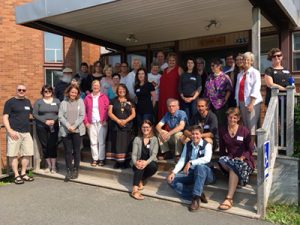“Process Water” Spill at Suncor – More Bad News for Canada’s Water
On Tuesday, March 26, Suncor announced that there had been a leak of “process water” (water used in the chemical process of separating bitumen from tar sands) at its tar sands plant north of Fort McMurray. Statements on the company’s website indicate that the leak, caused by the freezing and rupture of a 10-foot length of 4-inch pipe, began “sometime” on March 25 and was halted by 4:00 pm. The dirty water was leaked into an outfall pond (a body which holds used water prior to reuse or ultimate disposal into a tailings pond), and it is not yet known whether any of it went into the Athabasca River.
This leak comes at a fraught time in the debate over resource extraction and environmental protection in Canada. Over the last few months, Canada’s oil and gas industries have been shown to have influenced government decisions to reduce the water-related legislative and regulatory hurdles facing industry expansion, and the government has also marked the longstanding Experimental Lakes Area (ELA) research centre for closure. This decision has been roundly criticized by scientists such as Dr. David Schindler, the ELA’s founding director, and a strong critic of water management in the tar sands.
Indigenous communities across Canada have rallied against these legislative changes, which were put forward in budget Omnibus Bills C-38 and C-45. In addition to threatening water, they argue that the changes disrespect treaty and nation-to-nation relationships and ignore the Canada’s obligation under the UN Declaration on the Rights of Indigenous Peoples to recognize Indigenous peoples’ right to Free, Prior, and Informed Consent.
Chief Alan Adam of the Athabasca Chipewyan First Nation (AFCN) downstream from the tar sands in Fort Chipewyan, said in a press release today that the incident “is of great concern and substantiates my community’s long time concerns of the negative and adverse impacts this industry has on our eco-system, traditional lands and cultural rights.” The AFCN release also expressed concern about “ a faulty regulatory system, weak environmental protection and laws and legislation that cater towards an industry that continues to erode the very environment that his First Nation and many other First Nations rely on for the continuation and livelihoods of their people and culture.”
In 2009, KAIROS led a delegation of church leaders and Indigenous and global partners to the tar sands. The delegation visited the community of Fort Chipewyan and met with Chief Adam, among other leaders and community members. Its final statement and KAIROS’ policy paper on the tar sands, Drawing a Line in the Sand, both reflect concern about tar sands impacts on waterways, human and animal health, and traditional ways.
Recognizing the importance of water to all life, KAIROS watches this episode with concern and awaits news from the assessment of damage currently underway. We continue to be in solidarity with the people of Fort Chipewyan and renew our call to protect the waters of Northern Alberta, waters that sustain a vast and complex web of life. And we ask you to join us in that solidarity through our new campaign, Our Waters, Our Life.








